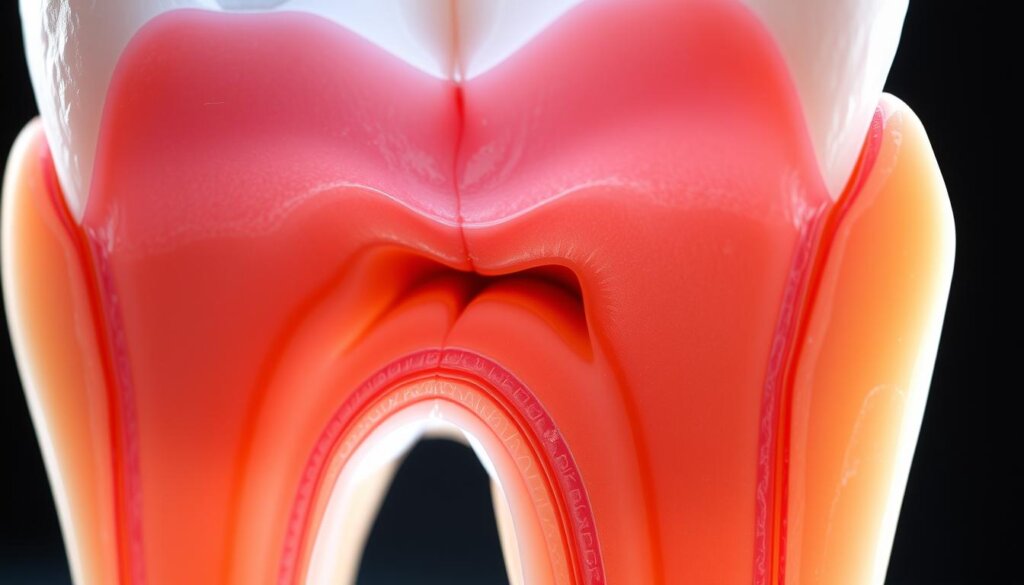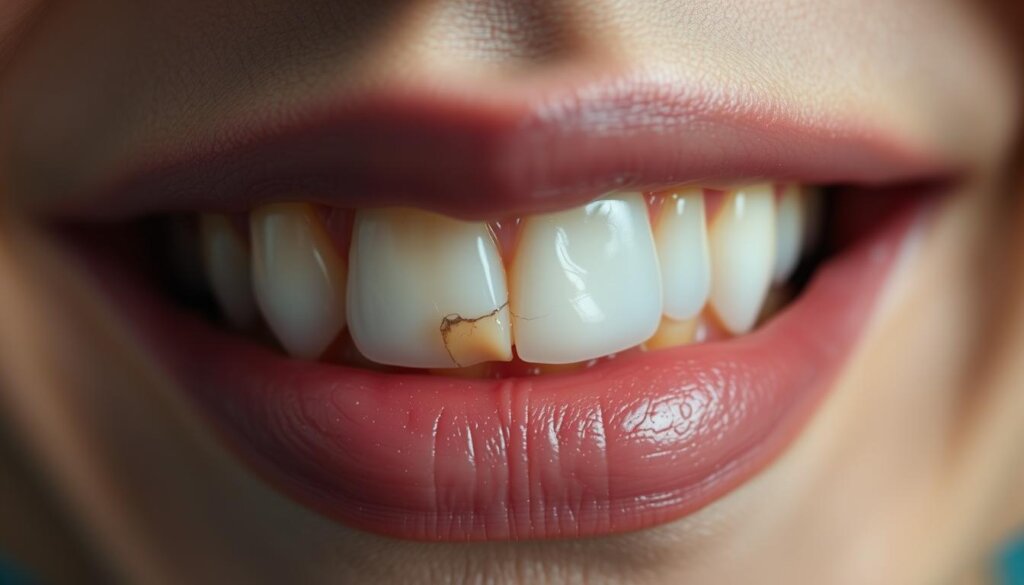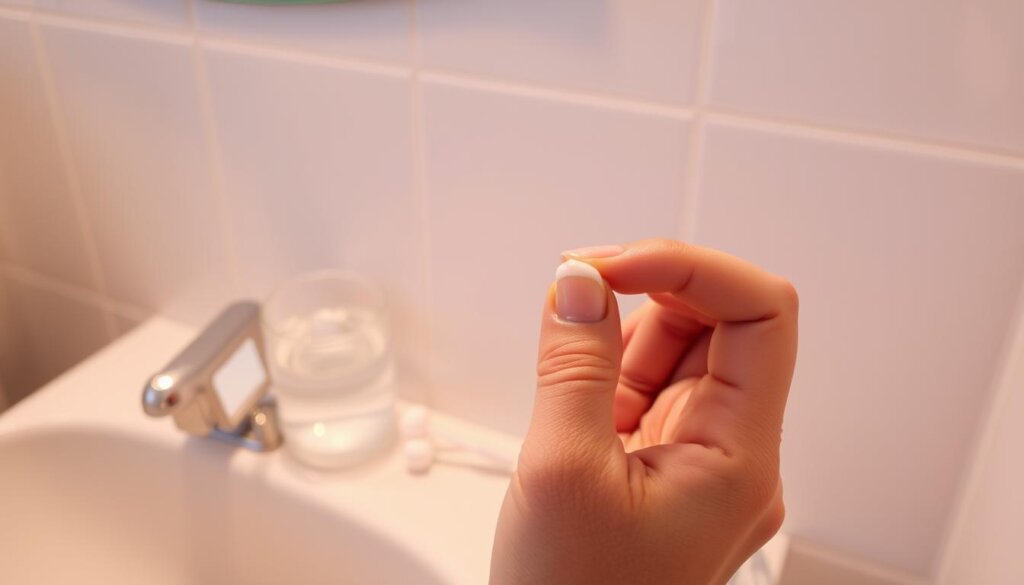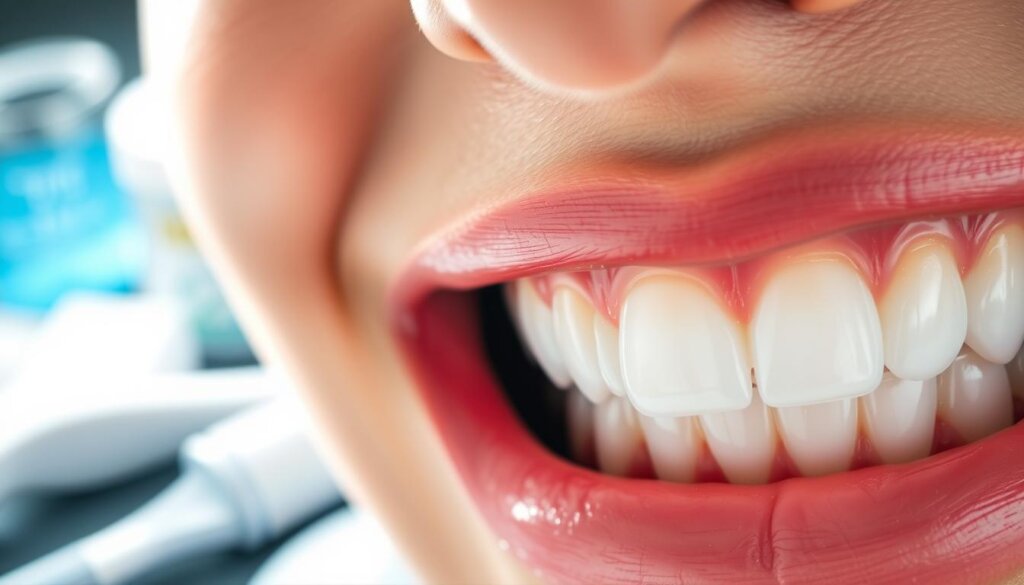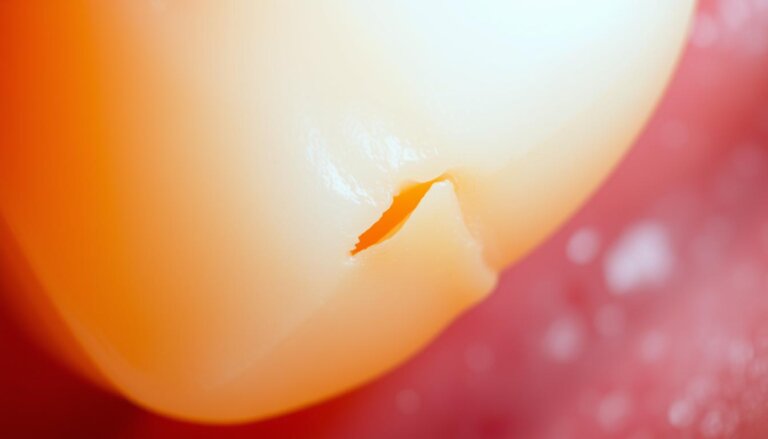Small Chip in Adult Tooth: Is It a Big Deal?
One in four adults in the United States has a chipped tooth. This raises a question: Is a small chip in an adult tooth a big deal? Dentists say even a small chip can lead to bacterial growth and sensitivity. They warn of hidden risks in what seems like a minor flaw.
Adult teeth are very strong. They handle daily wear and occasional grinding. A small chip in tooth enamel might seem harmless. Experts say patients with slight fractures often get composite fillings to seal the damage and lower infection risks. This shows why any chip, no matter how small, is important.
Key Takeaways
- A minor chip can allow bacteria to settle in.
- Even robust adult enamel is not impervious to breakage.
- Sensitivity may spread beyond the chipped region.
- Timely attention helps deter further tooth damage.
- Composite fillings support the tooth’s structure.
Understanding Tooth Structure
Teeth have many layers to keep them strong. The enamel on the outside protects them. Inside, dentin and the pulp chamber help with important functions. Even so, teeth can chip over time, needing quick care to stay healthy.
What Are Adult Teeth Made Of?
Adult teeth have a hard enamel layer, a softer dentin core, and a pulp with blood and nerves. This setup fights off bacteria and wear. Fixing a broken tooth early is key.
Differences Between Baby and Adult Teeth
Primary teeth are thinner and less strong than adult teeth. Adult teeth have a better shield. So, even small chips need attention.
The Role of Enamel
Enamel is the hardest part of our body. It keeps the inside safe from acid and grinding. Keeping enamel strong is key to avoiding chips.
| Layer | Key Function |
|---|---|
| Enamel | Shields inner tissue from external forces |
| Dentin | Provides structural support and transfers sensations |
| Pulp | Houses nerves and blood supply |
| Protective Care | Enables broken tooth repair when fractures occur |
Causes of Tooth Chips
Teeth can chip when they face repeated stress. Over time, surfaces weaken, leading to small breaks. Taking care of chipped teeth is key to keeping your mouth healthy.
Common Reasons for Chipping
Biting hard objects is a common cause. Grinding teeth at night also weakens enamel. Here are some reasons:
- Chewing ice or tough candy
- Unconscious teeth grinding (bruxism)
- Using teeth to open packages
Impact of Diet on Tooth Integrity
Some foods can wear down enamel. Acidic drinks and sweets lead to bacterial growth. Limiting these foods helps prevent chipping and keeps teeth strong.
The Role of Accidental Trauma
Physical injuries, like those from sports or slips, can chip teeth. Finding and fixing these chips early is important. Wearing mouthguards and being careful can help prevent chipping.
When Is a Chip Considered Serious?
A small crack might seem minor at first. But each part of the tooth plays a key role in how it works. Deep cracks need quick attention because they affect the tooth’s inner parts.
Experts look at how deep the chip is, if nerves are exposed, and if it hurts. They decide if you need treatment for a broken or cracked tooth. Catching it early can save your tooth’s look and health.
Depth of the Chip
Damage that only affects the enamel might not be as bad. But if it goes deeper into the dentin or pulp, it can cause pain and infection. Getting help fast can stop things from getting worse.
Location of the Chip
Chips on the biting edge can wear down teeth unevenly. Those near the gum can let bacteria in, leading to cavities.
Presence of Tooth Sensitivity
Feeling pain or tingling when you eat can mean the dentin is exposed. This is a sign you need to see a dentist right away to avoid more damage.
| Chip Severity | Recommended Action |
|---|---|
| Superficial (Enamel Only) | Simple repair or minimal contouring |
| Moderate to Severe (Dentin or Pulp) | Cracked tooth treatment or broken tooth treatment to protect nerve health |
Symptoms to Watch For
An initial chip may seem minor, but warning signs can appear. Look out for gum irritation and occasional soreness when chewing. Catching these signs early can prevent bigger problems.
Pain and Discomfort
A throbbing or sharp pain can mean injury. Mild aches from hot or cold foods are also a sign. If pain lasts and affects your daily life, it’s time to see a dentist.
Changes in Sensitivity
Fluctuations in sensitivity, like with temperature changes, show exposed dentin. Foods like sweets or acids can cause sudden pain. Watching for these changes helps in getting timely treatment.
Visible Damage
A chipped tooth shows as a fractured edge or uneven surface. The jagged part can irritate your tongue or cheek, raising infection risk. Regular mirror checks can spot small cracks early, leading to quick care.
Possible Health Risks
Is breaking an adult tooth a big deal if it’s just a small chip? Our research shows that even a small crack can cause big problems if ignored. Tiny cracks can let harmful germs get in and harm your tooth.
Increased Risk of Cavities
When a tooth chip happens, bacteria can hide in the weak spot. This leads to plaque buildup, causing decay. It’s harder to fight cavities once the tooth is broken.
Potential for Infection
In some cases, bacteria can get deep into the tooth, causing infection. You might feel sharp pain or swelling that won’t go away. Sometimes, a root canal is needed to fix it.
- Persistent tooth sensitivity
- Bitter or foul taste from abscess drainage
- Fever or facial swelling
Impact on Jaw Alignment
A small chip can change how you chew. You might bite differently to avoid pain, which can strain your jaw. This could lead to muscle or joint problems over time.
| Issue | Possible Outcome |
|---|---|
| Cavities | Decay that demands fillings or deeper treatment |
| Infection | Intrusion into the pulp, leading to root canal |
| Jaw Strain | Long-term bite misalignment |
Treatment Options for Small Chips
Teeth with a small chip need quick attention. Early treatment keeps the tooth looking good and protects it from more damage.
Dental Bonding
This method uses a tooth-colored resin that sticks to the chip. The dentist cleans and gets ready the area, then applies the resin. A special light makes it hard and smooth.
Dentists like bonding for small chips that don’t hurt the tooth much.
Tooth Contouring
This method shapes the chipped tooth to match the others. The dentist removes some enamel to fix the shape. It works well for small chips that don’t need a big fix.
Crowns and Veneers
These options are for bigger chips. Crowns cover the whole tooth for strength. Veneers stick to the front to look better and work well.
Both help keep the tooth stable and healthy for a long time.
Home Remedies for Minor Chips
Minor tooth chips can be unsettling. You might feel a rough spot that hurts your tongue or cheek. Home remedies can help ease discomfort and prevent more damage until you can see a dentist.
Good chipped tooth care is important. Simple steps can protect your tooth and stop bacteria from growing. You likely have these items at home to help you quickly.
Temporary Fixes to Consider
- Place sugarless gum over the chip to smooth rough edges
- Rinse with salt water to clear debris and lower infection risk
- Use mild over-the-counter pain relievers for occasional soreness
Natural Remedies to Soothe Sensitivity
Try warmed rinses with saline or diluted clove oil to ease pain. These methods help protect your tooth and prevent more damage. But, if the pain doesn’t go away or gets worse, see a dentist.
When to Seek Immediate Care
Getting help quickly is key when a tooth is badly damaged. Signs like severe pain, bleeding, or a loose piece of tooth are serious. Seeing a dentist early can avoid more complicated problems.
Signs That Require Urgent Attention
Acting fast can prevent serious damage. Look out for these signs that mean you need to see a dentist right away:
- Continuous throbbing pain
- Visible fracture beneath the gum line
- Sensitivity to hot or sweet substances
- Ongoing bleeding or swelling
Importance of Prompt Dental Visits
Don’t wait too long to see a dentist. Bacteria can quickly reach the pulp if you delay. Early treatment can save your tooth and avoid long, complicated procedures.
| Urgent Symptom | Potential Risk | Recommended Step |
|---|---|---|
| Severe Pain | Nerve Involvement | Immediate Dental Exam |
| Loose Tooth Fragment | Deeper Tissue Damage | Stabilization or Bonding |
| Persistent Bleeding | Pulp Exposure | Urgent Professional Care |
Preventive Measures
Keeping your enamel strong is key to avoiding chipped teeth. Good daily habits and careful choices can help a lot. It’s not just about brushing and flossing. It’s about making smart choices every day to protect your teeth.
Tips to Avoid Future Chips
Experts say to avoid foods that are hard on your teeth. Eating hard candy or using your teeth as tools can cause chips. Making a few simple changes in your diet and how you eat can help keep your teeth safe.
- Choose softer fruits and cooked vegetables
- Practice regular dental checkups
- Use nightguards if clenching is an issue
Role of Mouthguards in Sports
Playing sports can put your teeth at risk of injury. A mouthguard acts as a shield against sudden hits. Wearing a custom-made guard can help prevent chips and other damage. It’s a smart move for anyone who plays sports.
The Cost of Treatment
Fixing a chipped adult tooth can cost differently. People often choose between simple bonding and more complex veneers. They decide based on what they need now and what will last longer.
Experts say to think carefully before making a choice. Not fixing a chip can lead to bigger problems. This could mean more pain and higher costs later on.
Average Costs for Various Procedures
Small fixes like smoothing or bonding are usually cheaper. But, crowns or veneers cost more but last longer. The price depends on how many visits you need and any extra tools required.
Insurance Coverage Options
Insurance coverage varies by policy. Some cover necessary treatments, but cosmetic ones might not be covered as much. It’s a good idea to talk to your dentist and insurance to figure out what you’ll pay.
| Treatment | Approximate Cost |
|---|---|
| Bonding | $100–$400 |
| Veneers | $800–$2,000 |
| Crowns | $700–$1,500 |
The Psychological Impact
Smiling or speaking with a visible flaw can stir deep emotions. Some feel uneasy about public gatherings, believing every gaze falls on their chipped tooth. The mind may overthink these minor imperfections, leading to reduced self-assurance. Timely broken tooth treatment is key to restoring both comfort and confidence.
Effects on Self-Esteem
Minor oral damage can trigger significant internal doubts. Individuals might shy away from vibrant conversations or conceal their grin in photographs. This hesitation shapes daily habits and can lower self-esteem to a point where professional or personal relationships are affected.
Perceived Social Implications
Social circles may appear more judgmental when a person is anxious about a chipped tooth. Speech alterations, even if slight, may draw attention during group interactions. Some individuals withdraw from gatherings to avoid embarrassment. Early broken tooth treatment addresses these issues by safeguarding overall social confidence.
Aftercare and Maintenance
Keeping a fixed tooth in good shape is key. Good habits help avoid future dental problems and keep your mouth healthy. Brushing well and flossing regularly fight plaque. Regular dental visits catch problems early.
Oral Hygiene Best Practices
Brushing with fluoride toothpaste daily removes harmful bacteria. Flossing around fixed teeth stops food from getting stuck. Dentists often recommend the Modified Bass method for brushing. This keeps your teeth strong and less likely to break.
Follow-Up Appointments
Regular dental visits check if your tooth is doing well. If a crown or filling starts to move, catching it early is important. Dentists check your tooth’s health and fix any issues. If you feel pain, seeing a dentist quickly can prevent more problems.
- Brush at least twice per day
- Floss thoroughly and gently
- Inspect for sensitivity
- Consult experts if pain persists
| Method | Goal | Recommended Frequency |
|---|---|---|
| Brushing | Clear plaque and maintain enamel strength | Twice daily |
| Flossing | Remove debris between teeth | Once daily |
| Professional Cleaning | Deep plaque removal and thorough examination | Twice a year |
Conclusion: To Chip or Not to Chip
A chipped tooth might seem small, but it can hide bigger problems. Small cracks can weaken the enamel and lead to more damage. Getting it checked and fixed early is key to protecting your teeth.
Final Thoughts on Tooth Health
Dentists have many ways to fix a chipped tooth, from bonding to crowns. Acting fast can prevent bigger issues. Healthy teeth are essential for daily life and boost your confidence.
Importance of Regular Dental Checkups
Regular dental visits can catch hidden cracks before they become big problems. Fixing a chipped tooth early helps keep your enamel strong. Dentists can spot issues and help you keep your smile bright. These visits are vital for your overall health and confidence.

